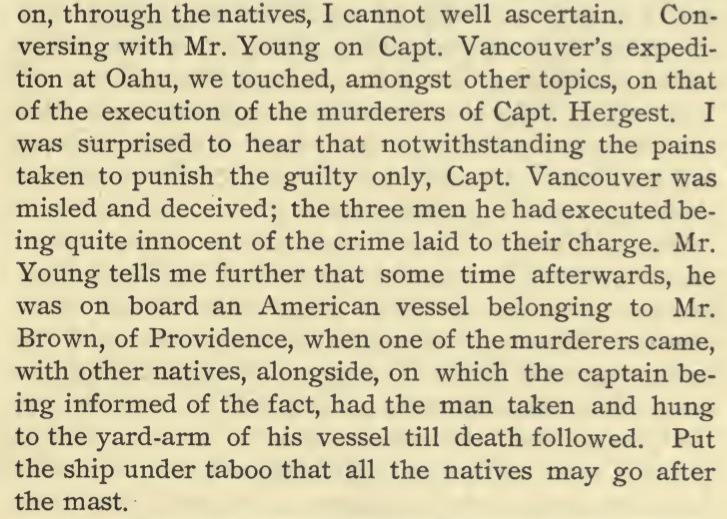Isaak Iselin in Hawaiʻi, 1807
 This is the version of the passage in the printed diary. Note the small differences between the two versions.
This is the version of the passage in the printed diary. Note the small differences between the two versions.
Iselin, Isaac. Journal of a Trading Voyage Around the World, 1805–1808. New York: anon., 1897, p. 69.
Intertextuality III – Comment
In this passage Isaak Iselin recapitulates a discussion he had with John Young. The passage is marked by several layers of ambivalence. First, although Iselin notes his source of information (that is, Young), he does not quote Young directly. Consequently, it is difficult to judge Young's own position in the telling of the story—for example, whether he was himself critical of Vancouver.
For his part, Iselin is also vague about his own feelings: «I was surprised» is not the same as «I was disgusted,» for example. In the original version, the phrase «till death followed» is followed by an exclamation mark—something that is omitted in the printed version. Does this exclamation indicate Iselin's ridicule of the whole exercise of British «justice»?
And it is important to note that Vancouver, the man who executed both «justice» and Hawaiians, is, through the use of the passive voice, exonerated from any personal blame for the deaths of three «innocent» Hawaiians. Rather, Vancouver «was misled and deceived.» Is this Iselin simply reporting Young's view? Or Iselin's own view of Vancouver's actions? Either way, the contradictions and hypocrisies of Vancouver's actions are left unexamined, as is the question of whether such «deceptions» more generally served to undermine Native Hawaiian confidence in EuroAmerican practices of law and administration.
